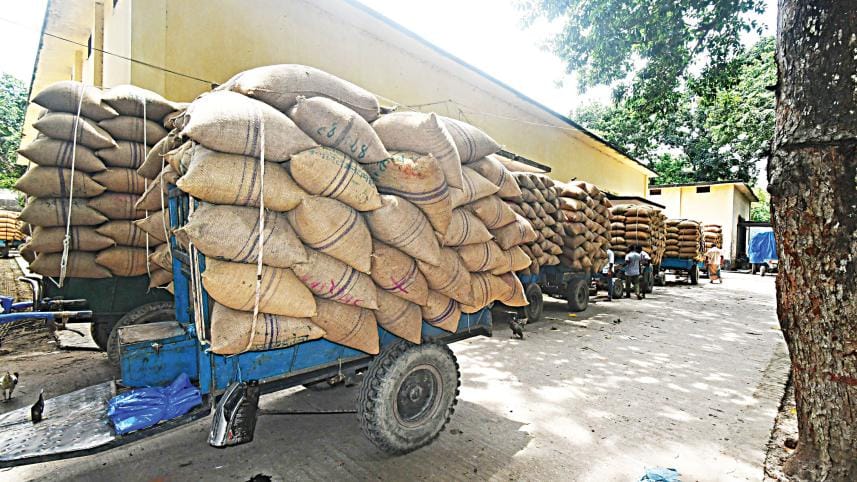Public food stock surges to 18-month high

Public food stocks in Bangladesh rocketed to an 18-month high in July thanks to higher procurement, imports of grains and reduced distribution, official figures showed.
Analysts described the stock as good since it would allow the government to tackle any untoward situation and intervene in the market to foil any attempts aimed at manipulation by middlemen.
On July 23, the stock of rice and wheat at public storage facilities stood at 19.53 lakh tonnes, the highest since January 2022, according to data from the food ministry.
In January last year, Bangladesh's public food stock was 19.85 lakh tonnes, the highest on record.
"We have a good production of Aman and Boro paddies. Our domestic procurement has been good so far as well," said Md Shakhawat Hossain, director-general of the Directorate General of Food.
The rice production estimate for the full fiscal year of 2022-23 is yet to be released by the Bangladesh Bureau of Statistics. Total production might rise 5 per cent to 4 crore tonnes for the year if estimates of the dry Boro season rice made by the Department of Agricultural Extension (DAE) are materialised.
The DAE estimates the Boro production to be 2.18 crore tonnes, the highest in history, up 8 per cent year-on-year.
The food office began to purchase Boro paddy and rice from local farmers in the first week of May and it has procured 10.13 lakh tonnes of rice from the domestic market so far.
The food directorate will continue buying the grains until August to achieve its procurement target of 15.10 lakh tonnes. Boro is the largest crop in Bangladesh, accounting for more than half of annual rice production.
Hossain said they are on track to achieve the Boro purchase goal but space constraint has become a matter of concern.
The food directorate has the capacity to store 21 lakh tonnes of foodgrain. The food ministry has asked law-enforcing agencies to take the delivery of cereal under the Public Food Distribution Programmes (PFDS) equivalent to three months.
"This will free up some space in the government warehouses," Hossain said.
The reduction in the distribution of grains is another reason for the pile-up of stocks. The food ministry distributed 30.08 lakh tonnes of cereal in the fiscal year of 2022-23, almost unchanged from the previous year.
As of July 13 of the current fiscal year, the total distribution of grain was 33,105 tonnes, which was more than three and a half times the 1.12 lakh tonnes distributed during the same period a year ago.
Md Jamal Hossain, director of the movement, storage and silo division at the food directorate, said apart from other food distribution programmes, the Food-Friendly Programme under the fair price card will start in September for three months.
A total of 4.5 lakh tonnes of the grain will be distributed at nominal prices during the three-month period, he said.
"The current stock of foodgrain will give some comfort."
The current level of food stocks at public warehouses is higher than the government-fixed security stock of 13 lakh tonnes, said Hossain, adding that his office plans to maintain a stock that is higher than that level.
Quazi Shahabuddin, a former director-general of the Bangladesh Institute of Development Studies, said the current foodgrain stock is good for distribution under various social safety schemes.
However, following the ban slapped by India on the export of non-basmati white rice, the government should explore alternative external sources so that it can purchase if the Aman rice production faces any disruption from any natural calamities or unfavourable weather.
Mohammad Jahangir Alam, a professor of agribusiness and marketing at the Bangladesh Agricultural University, said Bangladesh's import dependence on rice is low compared to its overall production.
"So, the latest ban on export by India is unlikely to create any effect on the domestic rice market."
He, however, added that measures should be taken to attain self-reliance in staple food production.
"We are on the safe side in terms of public food stocks. We will also get another crop in the next three months. However, the government should monitor the market intensively to prevent any attempt to manipulate prices by market actors."
Prof Ismat Ara Begum, director of the Institute of Agribusiness and Development Studies at the BAU, said the existing foodgrain stock is enough and the government is distributing the grains under PFDS.
"I don't see any reason to be worried," she said.




 For all latest news, follow The Daily Star's Google News channel.
For all latest news, follow The Daily Star's Google News channel.
Comments